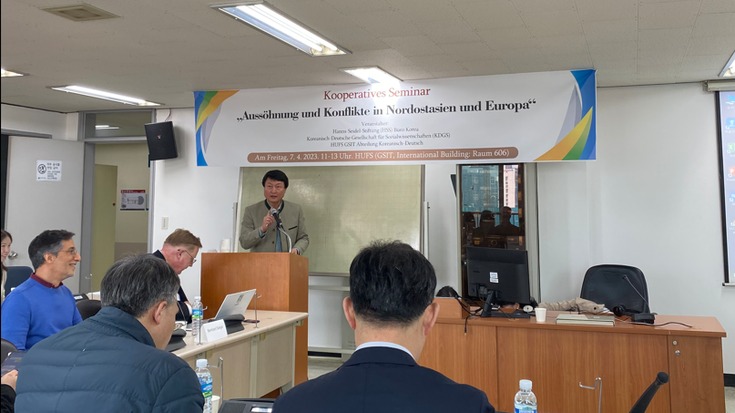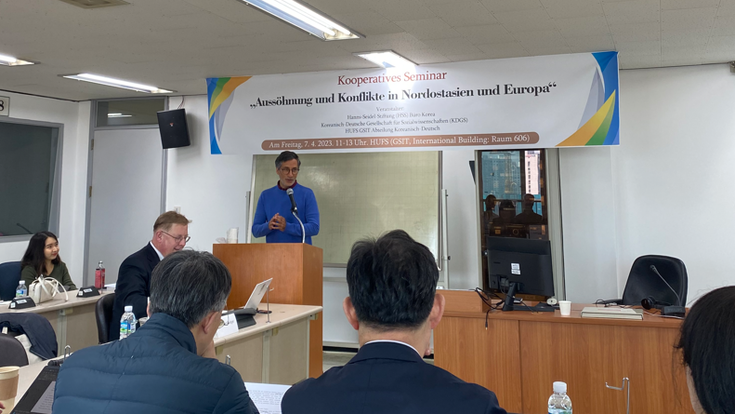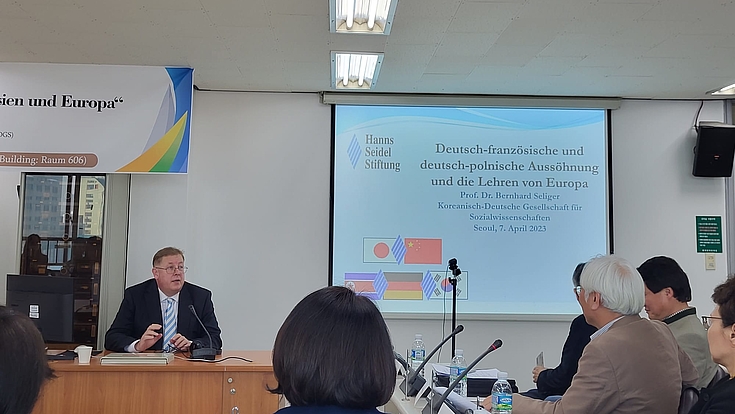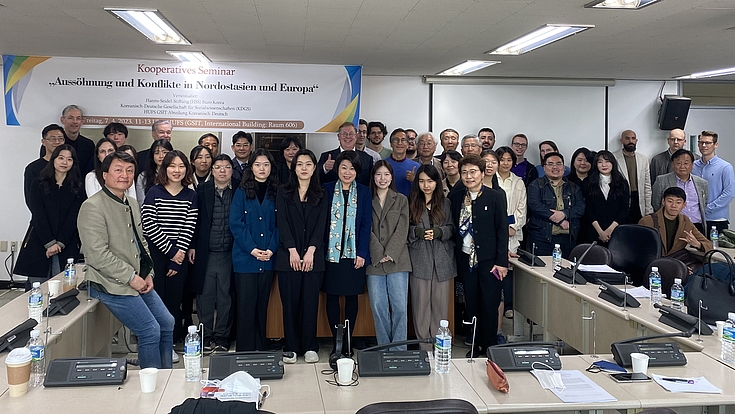Event
Cooperative Seminar of HSF Korea on the topic “Reconciliation and Conflict in Northeast Asia and Europe”

On April 7th, HSF Korea, together with the Korean-German Society for Social Sciences (KDGS) and Hankuk University of Foreign Studies (HUFS), Graduate School of Interpretation and Translation (GSIT), Korean-German Department, hosted a cooperative seminar on "Reconciliation and Conflict in Northeast Asia and Europe." HSF Korea’s representative Dr. Bernhard Seliger, project manager Young-Soo Kim, and research interns Johannes Hollunder, Annett Fischer, and Belinda Maier personally attended the event at Hankuk University of Foreign Studies in Seoul. After the respective representatives of the three organizers gave an opening speech, the moderator of the seminar, Prof. Dr. Myeong-Jae Cha, co-chair of the Association for Kyonggi Civic Education, introduced the first lecture of the event.

The first lecture was given by Prof. Dr. Alexander Görlach of New York University and Carnegie Endowment for International Peace (CEIP), which explored whether the rise of China will lead to a new Cold War. He first discussed the fact that the heads of state of Russia and China expressed their support for the preservation of the international order. In Western countries, this is understood as the preservation of human rights. However, since neither Russia nor China respects human rights, they have a different understanding of what the international order means. Vladimir Putin himself believes that human rights are a Western invention that should be rejected. Dr. Görlach also emphasized that the often-used term "West" does not refer only to Western countries, but rather an order of like-minded countries shared across all directions. Dr. Görlach described the "project of democracy" as an unfinished emancipatory project, freeing itself from the pre-modern systems that the leaders of Russia and China are trying to reintroduce. Xi Jinping's hostility toward Taiwan is therefore based on the fact that Taiwan, as a functioning democracy, offers the Chinese population an alternative model in close proximity and thus poses a serious threat to the regime. Future developments between China and Taiwan will also be crucial for DPRK, as the country has developed a significant dependence on China.

Dr. Bernhard Seliger gave the second lecture of the event. His lecture focused on "Franco-German and German-Polish reconciliation and the lessons of Europe". He explained how Germany and France had also once developed an enmity. As factors of success for the final reconciliation process between Germany and France, Dr. Seliger mentioned the return to the common historical heritage as well as the Franco-German youth network, which has existed since 1963 and was established for the purpose of mutual exchange and the strengthening of bilateral cultural understanding between German and French pupils, students, and young people in professional training. Regarding the relationship between Germany and Poland, Dr. Seliger first explained that it is a process of reconciliation that has not yet been completed. However, what has fostered a rapprochement between the two countries, according to Dr. Seliger, was yet again a German-Polish youth network. Moreover, Dr. Seliger emphasized that even though Germany committed most of the crimes in Poland, this rapprochement also started from the victim state. Therefore, he sees it as crucial, also with regard to the reconciliation process between South Korea and Japan, that both the "victims" and the "perpetrators" in the Korean-Japanese conflict reach out to each other since it is only in the power of the victims to decide when their suffering has been adequately addressed.
Following the two presentations, three discussants commented on what had been said.
One participant in the discussion was Dr. Young-Don Choi of KDGS, who asked Dr. Görlach to what extent the concept of a new Cold War should be considered appropriate at all. Dr. Görlach replied that the term Cold War is understood to mean a war between two superpowers. Therefore, the current situation between the U.S. and China cannot actually be described as an imminent new Cold War, since China is merely a regional great power, not a superpower like the United States. Regarding Dr. Seliger's presentation, the question has arisen as to what extent the youth networks he presented could be introduced to South Korea and Japan. According to Dr. Seliger, the establishment of a youth network would provide more opportunities for reconciliation between the two countries than any other policy. Dr. Seliger believes that the Japanese government would be quite willing to invest in the future, even if they do not want to be held responsible for past crimes.
Another discussant was Prof. Dr. Chi-Won Choi from Korea University, who remarked about Dr. Seliger's lecture that in the case of South Korea and Japan, no symbolic gesture, such as the Warsaw Genuflection between Germany and Poland, has been carried out on which a rapprochement of the two countries can be built. Dr. Seliger then made it clear that opportunities for symbolic activities must be urgently created between South Korea and Japan. He said that in the European examples he had presented, they had also first dealt with issues such as economic cooperation before finally working their way toward resolving more difficult issues such as forced labor. Precisely because South Korea does not have many neighboring countries, Dr. Seliger sees it as even more important to finally initiate the reconciliation process with Japan.

In the following, the participants from the audience were also given the opportunity to comment on the presentations. In this context, it was first pointed out that in the past, there had been clear resistance on the part of the South Korean population to an attempt at rapprochement with Japan. However, Dr. Seliger countered that even the rapprochement steps for the reunification of Germany were not supported by the entire population at that time. The audience also arose the question to what extent a war between China and Taiwan is to be expected. Dr. Görlach clarified that while it is not unlikely that war will occur, developments between the two countries remain relatively open. As a larger power, he said, it remains for China to offer other military options that could still circumvent war.
